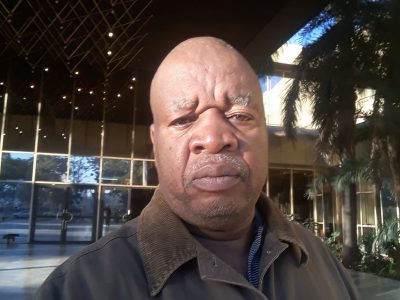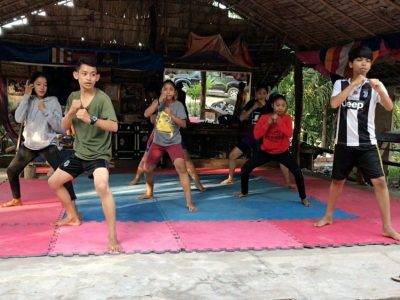Com a molts països africans, la majoria dels angolesos amb prou feines guanyen dos dòlars al dia. El govern d’Angola va fer un pas per a intentar desenvolupar el país de forma que es pogués equiparar a altres països del món. Aquesta vegada va decidir construir blocs de pisos a Kalimba, a uns 30 km de Luanda, la capital.
Per a aquesta tasca, el govern va contractar una empresa xinesa, China International Trust and Investment Corporation [en] [nota del traductor: CITIC és propietat del govern xinès], i els va pagar amb el recurs natural del país, el petroli.

Els nous pisos a Nova Cidade Kalimba. Foto cortesia de constructiondigital.com
La companyia xinesa va fer bastant bé la feina i va construir 750 pisos en blocs de vuit plantes cadascun i cada pis costava 75000 euros, un preu que els locals no podrien pagar ni en vint anys.
El blocaire Francois-Xavier [en] considera que el govern hauria d'haver fet servir el petroli per desenvolupar les indústries locals, cosa que hauria creat llocs de treball per als ciutadans:
Or how the exploitation of Africa’s natural resource benefits only banks and multinationals! Its quite a shame for an African government to go for such a move. Oil and natural resources revenues must be used to develop heavy industry, the main engine of any economy and which is sorely lacking in Africa. This will allow access to employment and a fair redistribution of wealth and thus increase the purchasing power of brave Africans. Africans are not needy for luxury. That’s a sheer lie that is being publicized by western corporatist media working with the tiny yet heavily corrupted African elite.
A l'hora de parlar dels preus dels pisos, diu:
That will take 20+ years to a man that has a wife and 4 children to pay up. A crazy one will ask:”Why does he have 4 children?” and I will answer him “Go to h***”. Do not drag Africa in your crisis spiral.
This is Africa [en] intenta explicar per què hi ha ciutats fantasma a la Xina i a Angola:
It would be easy to condense the real reason for this craziness into one word, namely: “Communism!” – or maybe four words: “Communism and Marxism-Leninism” – considering that the one-and-only ruling party in the People's Republic of China is officially committed to these socio-political ideologies, but my gut-feeling tells me there’s more to this weird phenomenon of building cities well in advance than meets the eye.
History has proven that in almost every single country in the world where revolutionary socialist movements have taken root, and more so when the people are ruled by a one party state, that there is always a massive misallocation (legalized theft) of capital by the ruling government.
So what are these ‘Masters of Darkness’ planning now with the numerous, largely uninhabited, structures that are popping up in strange remote places, mainly in countries controlled by communist forces? These new cities with their tarred roads, patches of green lawn, and neat rows of apartment blocks surely cannot be for the benefit of the working classes, as the cost of purchasing an apartment in any one of these new developments is well out of reach for the average working-class family. The communist manifesto that claims, “…we represent the interests of the working classes,” is thus complete and utter bullshit!
Seria fàcil explicar la veritable raó d'aquesta bogeria en una sola paraula, a saber: «comunisme!», o potser en quatre paraules: «comunisme i marxisme-leninisme», si considerem que l'únic i inigualable partit que mana a la República Popular de la Xina està compromès amb aquestes ideologies sociopolítiques, però tinc el pressentiment que hi ha alguna cosa més darrere d'aquest estrany fenomen de construir ciutats.
La història ha demostrat que en gairebé tots els països on han arrelat moviments revolucionaris socialistes, i especialment quan la gent està governada per un estat de partit únic, sempre hi ha una mala assignació (robatori legalitzat) del capital per part del govern.
Per tant, què pretenen aquests «Senyors de la Foscor» amb les nombroses estructures generalment desocupades que apareixen de sobte a estranys llocs remots, principalment a països controlats per forces comunistes? Aquests noves ciutats, amb les seves carreteres de quitrà, les zones enjardinades i els blocs de pisos ordenats, segur que no són per al benefici de la classe treballadora, ja que el preu d'un pis està ben fora de les possibilitats de la família treballadora estàndard. El manifest comunista que reivindica que «…nosaltres representem els interessos de la classe treballadora» és, per tant, una parida absoluta!
El bloc UChinaTravel [en] escriu:
It is believed to be one of the largest new building projects on the entire African continent. However, the reason this story received so much attention is the fact that the new development has been portrayed as a “Ghost Town,” as almost all 12,355 acres of the property are seemingly vacant. Nearly an entire year since the first round of 2,800 properties hit the market, only 220 have been sold.
Fauna [en] publica comentaris traduïts a l'anglès d'internautes xinesos al lloc web de chinaSMACK. A continuació teniu una mostra dels comentaris:
Those bunch of stupid losers have hyped/speculated the housing market all the way to Africa?
[Head of Chinese Academy of Social Sciences's Africa Research Office] He Wenping says, “This a construction project that benefits everyone, as well as the foundation for African economic growth”. == Sounds familiar!
Domestically [the country] keeps trying to tax us and raise the retirement age while squandering money abroad!!! China, I’m proud of you, I feel such pride!!!
The residential area is meant to help improve the people’s livelihoods —— Whether that’s the case there I don’t know, but over here its used to exploit us [with usury]!
A bunch of unscrupulous businessmen who after cheating people out of their money in China have now gone to Africa to lose face for Chinese people.
Tanmateix, un dels internautes qüestiona l'ús del terme «ciutat fantasma»:
BBC, this time you really have got it wrong, a “ghost town” according to China is a neighborhood where not a single person lives, and this new residential district in Angola no matter what still has a few people living there, so how can you guys say it is a “ghost town”????
Podran accedir els angolesos a aquests pisos construïts amb els diners i els recursos naturals del país?






